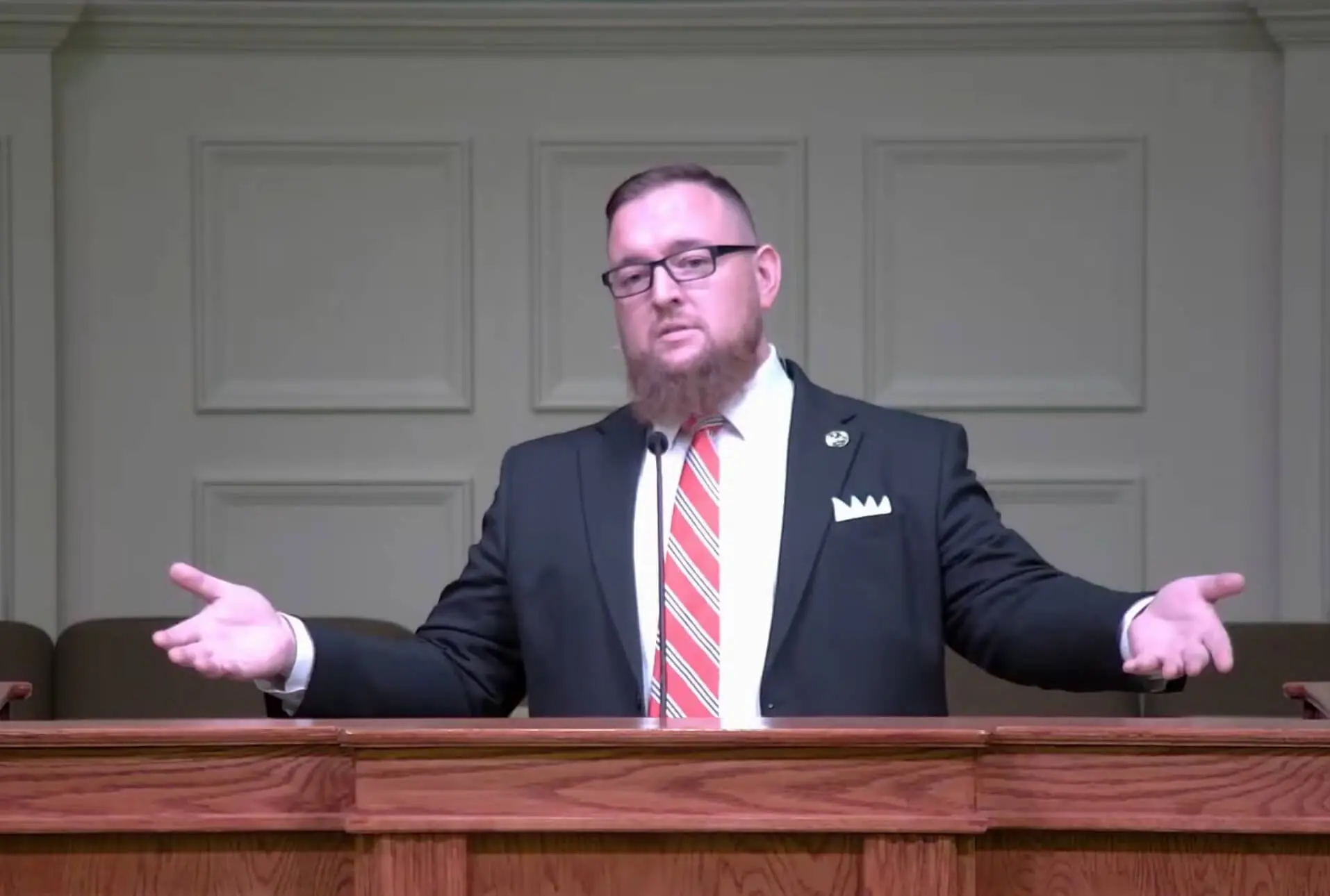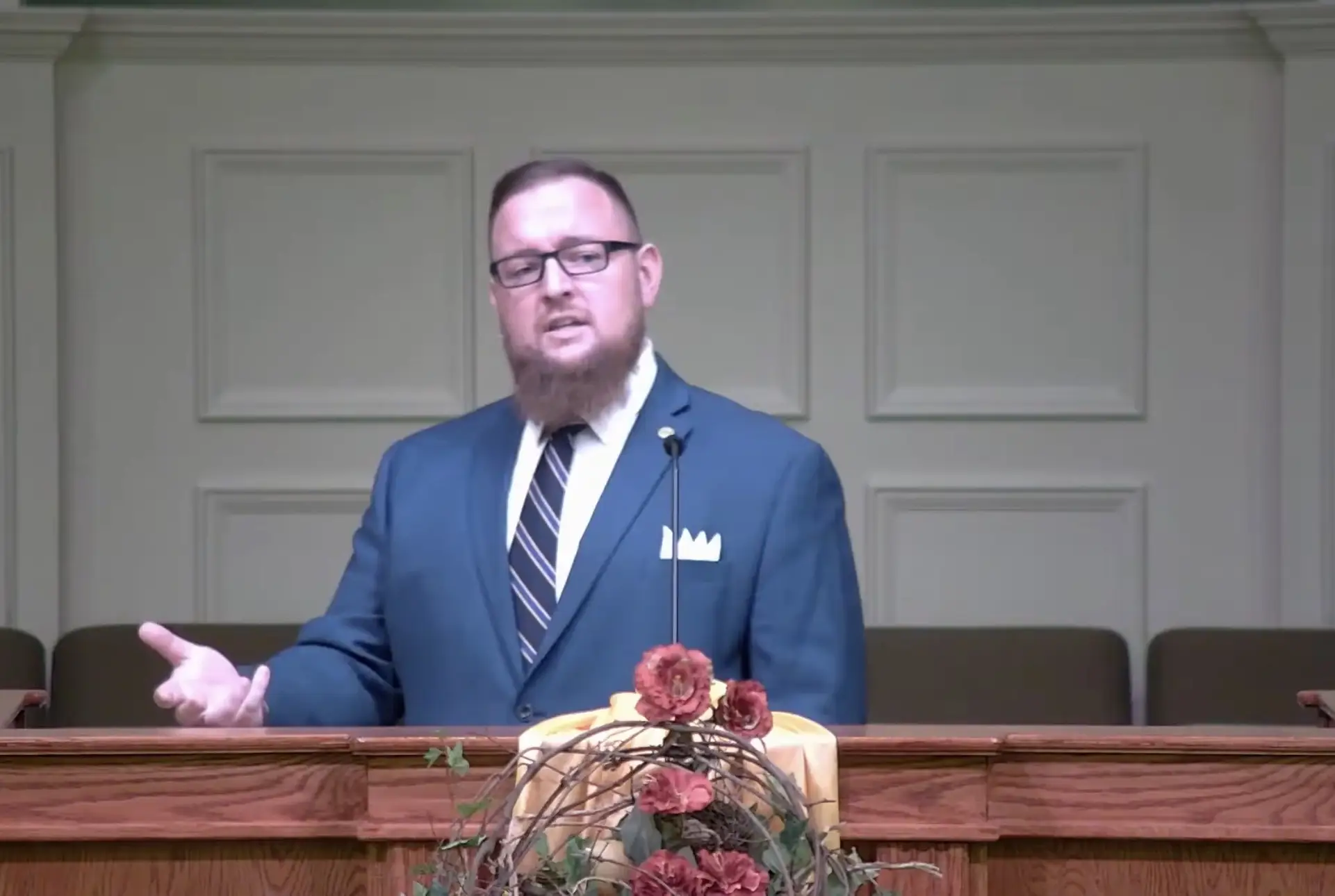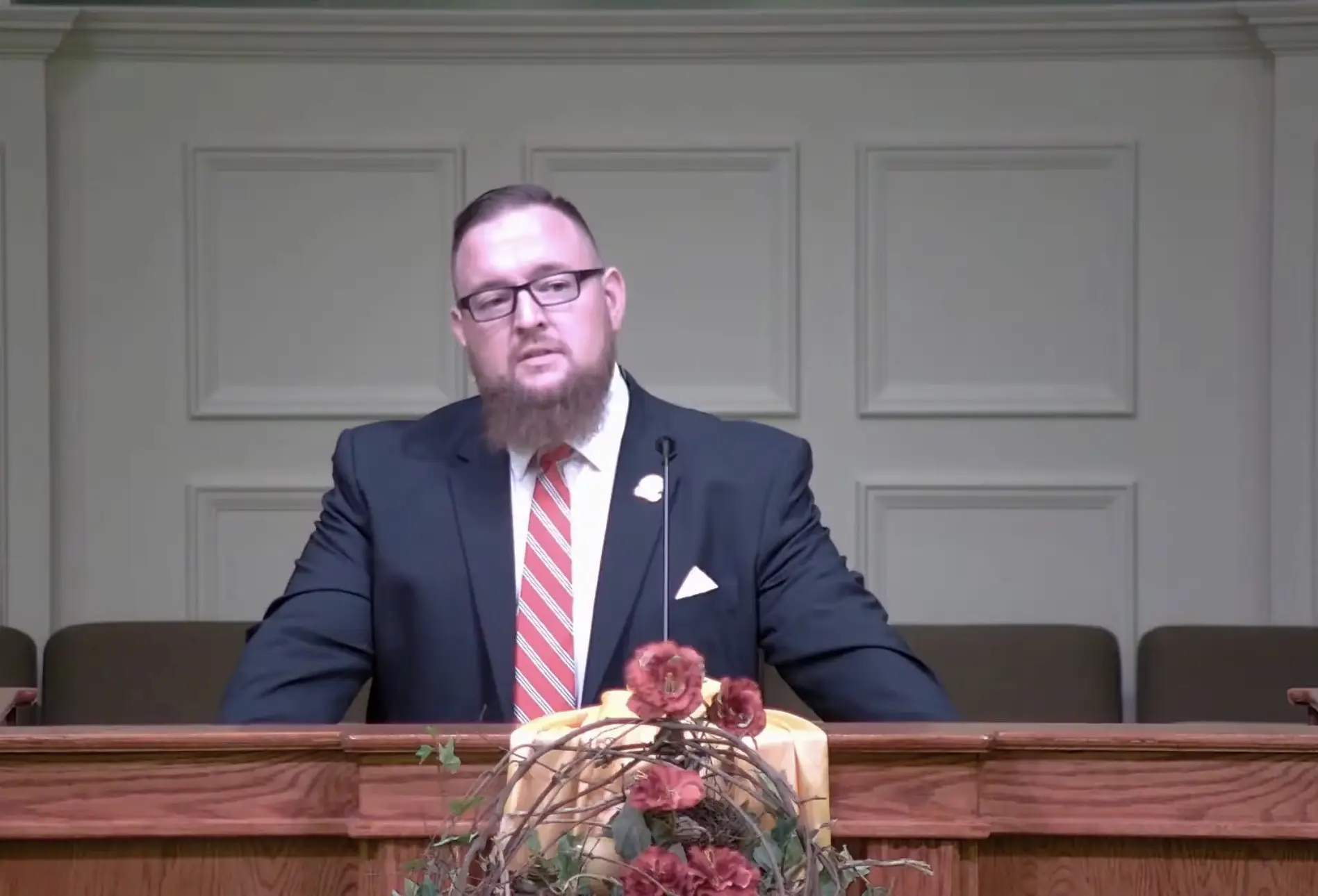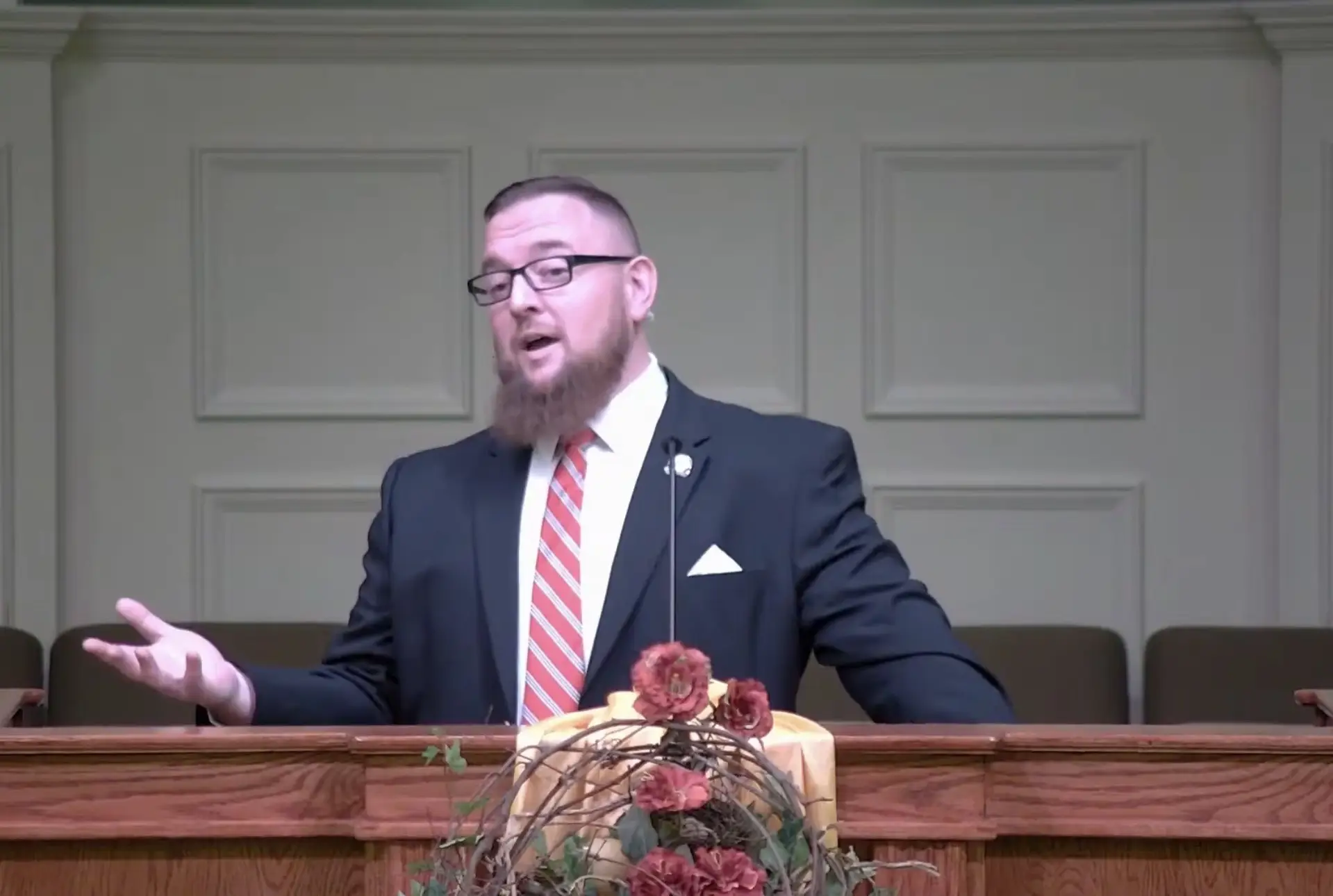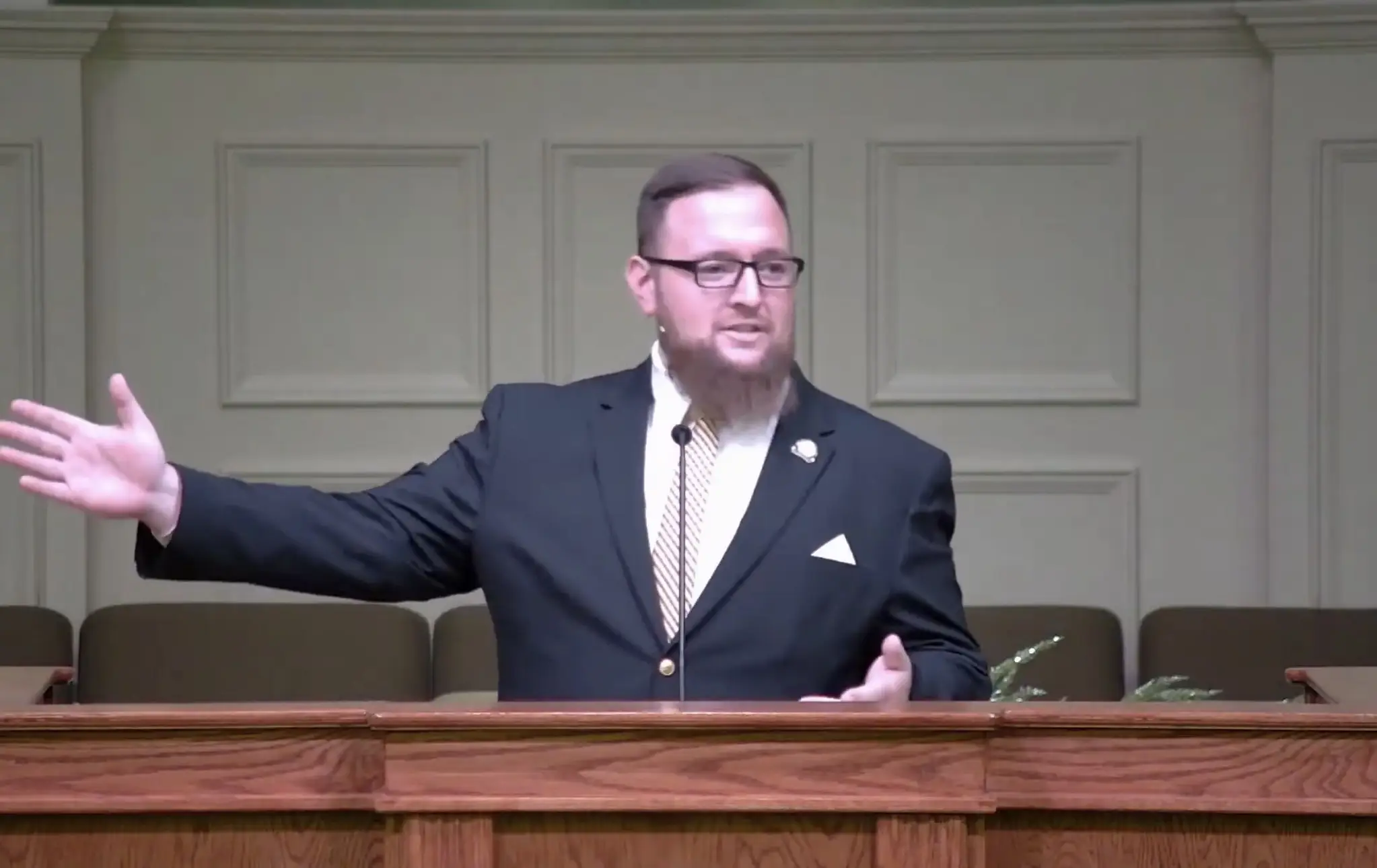Video
“Salvation and Judgement”
John 3:17-18
Pastor Ryan J. McKeen
05/04/2025
Audio
Transcript
Well, turn with me in your Bibles to John chapter 3.
As we’ve been working our way through John chapter 3, we’ve been repeatedly faced with a tension in these verses. And it’s a tension that we find throughout the Bible. And that is the tension between God’s sovereignty in salvation and man’s responsibility. And many people are uncomfortable with a tension in Scripture at all, two things that seem to be saying different or even opposite things, and yet they’re both clearly presented in the pages of Scripture, and people deal with these tensions in different ways.
Many people, again, are uncomfortable with such a thing, so they try to explain things in a way that eliminates the problem. And so with this tension between God’s role in salvation and man’s responsibility in salvation, what usually happens is one side is elevated while the other is minimized until it fits neatly within our own categories that we like to think about. For example, some people will say that God’s role in salvation is providing the option to be saved. that he sent his son to die for sin, for the sin of all people, and that all men have the same gift of salvation available to them. And all they have to do is receive what has been purchased and they will be saved. And it is up to them to make that decision.
And many times you’ll hear people say it like this because that’s what makes sense to us because what we see is what we do in salvation. We see our side of it. And so we try to explain what we see. And oftentimes that imbalances the tension that’s actually there in Scripture. And what we end up doing is what is supposed to be a tension is eliminated. And what’s supposed to be a tension here in these pages that we are studying between God’s sovereignty and man’s responsibility is it’s practically eliminated. And we end up with a salvation that is totally dependent on man’s free will or choice. But is that how the Bible presents salvation? Does that really reflect what we see on the pages of Scripture? Or does it simply flatten out what’s uncomfortable and make things easier for us to see and understand?
See, what we cannot do when we are presented with something difficult, something that is attention, two seemingly contradictory things in Scripture, what we cannot do is just pick our favorite side and ignore the other one. The tension we find here in John chapter three begins with Jesus’ words to Nicodemus.
In the first 10 verses of this chapter, we notice the term born again, and it’s used five times in the first 10 verses. Jesus continually tells Nicodemus, you must be born again. You must be born again, or born from above. And Jesus is speaking of the divine, supernatural, sovereign, and miraculous, and gracious work of God of regeneration. It is what God does in us. He takes the person who is dead in their trespasses and sins, and He breathes life into them. He makes a new creation. And Jesus’s point to Nicodemus is it’s nothing that you can do, Nicodemus. As much as you have built up yourself in this life with all of your personal righteousness, it doesn’t matter that you’re a Pharisee. It doesn’t matter that you’re a ruler of the Jews. It doesn’t matter that you’re a teacher of the Jews. It isn’t up to what you have done. It’s according to what God has done. It’s God’s work that saves us. And that is not of yourself. It’s a gift of God so that no one may boast. You must be born again. Not you must birth yourself again. It’s passive. You must be born again. It must be done to you. And that was the theme of verses one through 10. The new birth, regeneration, God’s work in salvation.
And then as we get to verses 11 and following, we see the theme of belief. You see the word believe seven times in these verses. So now the focus is upon what man is responsible to do. You must be born again, that is all of God’s work. And you must believe. That’s man’s responsibility. As we saw last week, the end of verse 15 and end of 16, whoever believes will in him have eternal life. For God so loved the world that he gave his only begotten son That whoever believes in him shall not perish, but have eternal life. You must believe. Salvation is by faith alone. Faith or belief is the means by which salvation is evidenced in the heart that God has made new. God has given a new heart to a person who was dead in their sin, and now they show that their heart is new by believing. By believing in His Son, Jesus Christ. No works involved. It is faith alone. Sola Fide. One of the pillars of the Reformation.
The Reformers, They were responding to the errors of the Catholic Church, which had built up a works salvation system. You must do these things in order to be saved and stay saved. And so they developed the solas, as we call them. And first there was sola scriptura. They affirmed that scripture, God’s word, is the highest authority for believers. Nothing raises to the level of authority that scripture does. Not what is stated by the Pope, not what is determined by church councils, not the magisterium of the Roman Catholic Church. None of it raises to the level of Scripture. That’s where they started. None of those things are divine and inspired. They’re not authoritative revelation from God. Sola Scriptura was the foundation.
And then they came to Solus Christus. Christ alone. Christ alone is our savior. Christ alone is our mediator. Christ alone is our priest. Mary is not a co-redeemer or a co-mediator. Only Christ. Christ alone. And then sola gratia, by grace alone. Salvation is by grace and not by works. Not by the things you need to continue to do throughout your Christian life in order to keep your salvation, as the Roman Catholic Church was teaching. Grace alone. It’s a gift. And then, faith alone. We are saved by faith. Not keeping the sacraments. Not confessing to a priest. Not paying our offerings or indulgences. None of that. We are saved by faith alone. And then the last one is soli deo gloria, for the glory of God alone. And these make up and define the Reformation. That is what makes us Protestant, or not Roman Catholic, because we believe in those things.
That’s what separates the Reformers and the Protestants of today from the system of the Roman Catholic Church. And that is one of the main focuses of this passage is sola fide, by faith alone. You must believe. You must believe in the Son. It is about faith and faith alone. And again, all of this comes on the heels of verses one through 10, which talked about God’s sovereignty in salvation. God is the one who makes us born again, who regenerates us. But we can’t emphasize one and minimize the other. God must sovereignly work in the heart of a sinner to regenerate him. And man must believe in Jesus Christ. In verses 1-10, Jesus is talking to a non-believer.
Nicodemus does not believe yet. He’s talking to a man who is a leader in what had become a defective and heretical apostate religion. And he wants to bring him a knowledge of the truth. And that’s why he continually says, truly, truly, Nicodemus, truly, I’m trying to get the truth to you. This is true. As if he’s saying, Nicodemus, you might be the teacher of Israel, but you’re in error. I want to tell you the truth, Nicodemus. And the first thing you need to know is that salvation is a work of God. It doesn’t depend on you. We saw that in the first 10 verses there.
Then as the teacher of Israel, the expert in the Old Testament, Jesus teaches him from the Old Testament. He teaches him that just as Moses lifted up the serpent in the wilderness, Nicodemus, that was pointing to something. Even so must the Son of Man be lifted up. And then in verses 15 and 16, the focus becomes on the ones who believe. The ones who believe these things, Nicodemus. The ones who believe in the Son of Man who will be lifted up. They will be saved. So again, on the one hand, he’s teaching Nicodemus about the sovereignty of God. And on the other hand, he’s teaching him about his responsibility to believe. And there are warnings in this passage as well, as we will get into this morning.
There are warnings to further explain the responsibility of man. And these verses this morning we will focus on will give us these warnings. If you don’t believe, you must believe to be saved, but if you don’t believe, you will be condemned. If you don’t believe, you will be judged. Which means if you don’t believe, then you are responsible for your unbelief. You will be held guilty. You will be punished. That is human responsibility. So you must believe, you need to believe. And by believing in the Lord Jesus Christ, the Son of God, you will not perish, but you will have eternal life. You have both the negative and the positive sides of human responsibility here.
You will bear the full weight of God’s judgment and wrath if you refuse to believe in the Son. And on the other hand, if you do believe, eternal life waits for you, no matter who you are. Divine sovereignty and human responsibility come together in John 3, and you can’t get around them. You can’t just focus on the one we like and ignore the other. Both of them are here. Both of them are true. And both are part of God’s glorious plan of salvation.
I’ve titled this message today, Salvation and Judgment. And some of you told me that, I can’t wait to hear you preach on judgment. You guys are kind of weird. But we’re preaching on salvation and judgment today because that’s what we see in John 17 and 18. Those are the two outcomes that await human beings. Salvation and judgment. Man is responsible to believe and depending on whether or not he does, He will face either salvation or judgment. And these two verses divide exactly that way this morning. The two destinies for each person are, in verse 17, we see salvation. And in verse 18, we see judgment. So I’ll read our two verses this morning.
John chapter 3, verses 17 and 18. This is the word of the Lord. For God did not send his son into the world to judge the world, but that the world might be saved through him. He who believes in him is not judged. He who does not believe has been judged already because he has not believed in the name of the only begotten son of God. So again, we see the first focus here is on salvation. Verse 17 begins with a four, which means it explains what came before it. And in verse 16, we just saw that whoever believes in him shall not perish, but have everlasting or eternal life. And now John explains why they won’t perish.
To perish, in biblical language, is to receive God’s final and eternal judgment. To bear the weight of God’s wrath for eternity. Perish does not mean be eliminated. Because in hell, the unbeliever will not be eliminated or destroyed. He will eternally burn in the lake of fire, and the fire will never go out. And John says that the reason for the incarnation was not simply so that man would perish. God did not send His Son into the world to judge the world. Jesus himself later in chapter 12 declares, and if anyone hears my words and does not keep them, I do not judge him, for I did not come to judge the world, but to save the world. And in Luke, Luke 19:10, he says, for the Son of Man has come to seek and to save the lost. That’s why he came. God will judge those who reject his Son. We’ll see that in the next verse. But that judgment was not the mission of the son in his first coming.
Jesus came to save his people from their sins. That’s what his very name means. Matthew 1.21, she will bear a son and you will call his name Jesus. Why? Because he will save his people from their sins. He came to save his people from their sins. God did not send his son into the world to judge the world, but that the world might be saved through him. And John 3:17 here is a favorite verse of universalists. Universalists are those who believe that all people will be saved. And yes, there are universalists out there. Our recently deceased Pope was one of them.
Again, they are those who say that Jesus came to save all people, therefore all people are saved. They point to this verse and say, look, Jesus didn’t come to judge, therefore no one will be judged. That might seem to be what this one verse is saying if that is the only verse you ever read. But this verse does not say that Jesus will never judge. It simply says that the reason he came in his first advent, in his first coming, was for the purpose of salvation. To provide salvation. And God’s purpose in sending his son into the world was not to condemn the world, but to save people from all over the world through him.
And the reality is that there are those who will refuse. They will refuse to believe in him and receive salvation. We all know people who refuse to believe the gospel. And we were told this would happen. Back to John chapter 1 where we’ve already been. John 1, 10 through 12. He was in the world and the world was made through him. and the world did not know him. He came to what was his own, and those who were his own did not receive him. But as many as received him, to them he gave the right to become the children of God, even those who believe on his name. And Jesus, in chapter five, as he’s rebuking the Pharisees, He’s even harsher with these Pharisees as he is with Nicodemus here, but in John chapter 5, verse 39 to 40, he says, you search the scriptures because you think that in them you have eternal life, but it’s these that bear witness about me, and you are unwilling to come to me so that you may have life.
You are unwilling to believe what you’re reading. You refuse to come to the One who will give you eternal life. The mission of the Son was to bring salvation, but the consequence of sinners rejecting Him would be judgment. In fact, you can’t even say that Jesus didn’t bring judgment in His first coming. It just was not His mission. Because in John 9, 39, Jesus said, for judgment I came into the world, so that those who do not see may see, and that those who see may become blind. Again, we have a tension. Did he come for judgment or not? And the way that we should understand this tension is that coming to bring salvation necessarily implies judgment. It’s the other side of the coin. Jesus came to bring salvation. But the very fact of salvation for all who believe implies judgment for all who do not believe.
So He came to bring salvation, and with it came judgment. And in this verse, John 3, 17, to judge the world. That word judge has a meaning a lot like condemn, to condemn as guilty. Some people will, in fact, be condemned. And that is the result of Jesus’ coming to the world. But again, the purpose of his coming was not simply to bring condemnation. On the contrary, it was to be the savior of the world. And the way the world is functioning, or that word world, we’ve seen it over and over again through this passage. And again, it’s functioning like it was before. John uses the word world in verse 17 three times. And it’s not speaking about every single individual as if Jesus tried to save everyone, but he failed. It’s saying he came to save people from all over the world, not just Israel.
You see, Jews like Nicodemus, they had this idea that the Messiah was coming to finally judge those other nations, but not the Jews, because they were the chosen ones. Because the Jews were God’s chosen people, that exempted them from judgment. But that was not the case. In fact, the Jews were warned about this. They were warned about looking forward to the day of the Lord for the wrong reasons. Looking forward to the day of the Lord and not being warned to repent of their sins. The prophet Amos gave them this warning in Amos 5, verses 18 to 20. He says, woe to you who are longing for the day of Yahweh. For what purpose will the day of Yahweh be to you? It will be darkness and not light, as when a man flees from a lion and a bear meets him. Or he goes home and leans his hand on the wall and a snake bites him. Will not the day of Yahweh be darkness instead of light? Even thick darkness with no brightness in it. It’s a warning.
He’s saying, if you’re not really one of God’s people, don’t be looking forward to the day of the Lord. The day of the Lord brings judgment. And Israel was longing for this day for the wrong reasons. They thought it would be a time of political victory where Israel would finally take over the world. And the judgment would be for the other nations. And the prophet here is saying that is a foolish interpretation of the day of the Lord. That is not why the Messiah was coming. The Messiah was coming to deliver God’s people, yes, but to call them to repent of their wickedness. Not only that, the point of Jesus coming was not just to redeem Israel and to condemn the Gentiles, but so that people from all over the world might be saved through him. God’s gracious offer of salvation extended beyond the borders of Israel. And once again, Nicodemus and all of Israel should have known this. It was in the Abrahamic covenant.
In Genesis 12 verse 3, I will bless those who bless you. It’s God speaking to Abraham. This is the promise to come. This is what would happen through Abraham’s offspring. I will bless those who bless you, and the one who curses you I will curse, and in you all the families of the earth will be blessed. So no matter who you are or where you’re from, there’s only one Savior. Jesus is the only way to salvation. And if you do not submit to Him in faith as your Savior, you will face judgment. Which means that every other religion out there does not have their own truth. If you are outside of Christ, you don’t have the truth. You don’t have a Savior. You just have a bunch of useless attempts to obey your way into heaven. But who’s going to pay for your sin? If you reject the Savior, the one who paid the penalty, if you reject Him, then there’s no one left to pay your penalty for you.
There is only one way, one truth, and one life, and no one comes to the Father except through Him. Not near Him, not around Him, through Him. That’s what verse 17 of John chapter three says, that the world might be saved through Him. You have to come through Him. You can’t just acknowledge he was a good prophet or a good teacher or a good man. You’ve got to come through him. He came so that people would come to salvation through him. Not through their own system or religion. That’s what Nicodemus needed to hear. His system was not going to cut it. He needed to come through him. Salvation was the reason why Jesus came. And that’s the first focus of this text this morning. God did not send His Son into the world to condemn the world or to judge the world, but that the world might be saved through Him.
But again, it does not stop there. Verse 18 continues, there’s another side of the coin. Verse 18 speaks of the judgment. It says, he who believes in him is not judged. He who does not believe has been judged already because he has not believed in the only begotten Son of God. Although God graciously offered salvation to the world through the work of Christ. That salvation is not received unless someone comes by faith, through genuine faith in Him. Which also means that for all people who respond to the gospel with unbelief, all people who reject Him, all people who say, that’s fine for you, but not for me. Everyone who says, you have your truth and I have mine, their result will be judgment. But here John starts verse 18, with he who believes in him is not judged. These are the ones who receive the salvation of verse 17. In this phrase, he who believes.
Remember last week when I explained from John 3:16 that word whoever. It’s a participle meaning the ones believing. That’s the exact same word as here in verse 18. He who believes. It’s in fact spelled exactly the same. So what it means here is what it means in verse 16. The one who believes. It’s not a broad statement saying that Christ died for all people like some people take whoever in verse 16 to mean. It’s actually very restrictive. He who believes. No one else. He who believes will be saved. Only the ones who believe. Salvation in Jesus Christ is very exclusive. It excludes people.
And in a few chapters, Jesus again will explain in John chapter five. Truly, truly, I say to you. This is verse 24 of chapter five. Truly, truly, I say to you, he who hears my word and believes him who sent me has eternal life. and does not come into judgment but has passed out of death into life. Who is it that will be saved? Who is it that Jesus came for? He who hears and believes. He who believes in him is not judged. This is what Paul is getting at in Romans chapter eight, where he says, therefore there is now no condemnation for those who are in Christ Jesus.
There is no condemnation for those who are in him. He who believes in him is not judged. He’s not condemned. For all those who are in Christ Jesus, all those who are saved through him, and if you are in him, As Romans 8.1 starts the premise, those who are not condemned because they’re in Christ Jesus, later on in Romans 8, verses 33 and 34, this is what he explains the result of that is. Romans 8.33, who will bring a charge against God’s elect? Who is the one who justifies? Who is the one who condemns? That’s that same word for judgment. Christ Jesus is he who died. Yes, rather, who was raised, who is at the right hand of God and who also intercedes for us. There is therefore no condemnation for those who are in Christ Jesus.
If you are in him, you cannot be judged. You can’t. Christ was already judged in your place. He was already condemned in your place, so you cannot be condemned. Who is going to bring a charge against God’s elect? What can they accuse you of? It’s already been paid for. Who is going to bring a charge? Christ Jesus is the one who justifies. He who believes in Him is not judged. He’s not judged. He cannot be. He is saved. But now the question of verse 18, is saved from what? Saved from what? Jesus didn’t come to bring judgment to the world. He came so that the world might be saved through Him, but saved from what? You see, the world is already in judgment. That’s what it says.
He who does not believe has been judged already, because he has not believed in the name of of the only begotten Son of God. Jesus didn’t need to bring judgment into the world because the world is already in judgment. He came to deliver some from judgment. He who does not believe has been judged already. It’s not as though you’re on neutral ground here and you’re awaiting to hear whether or not you’re going to be judged. As if you could go either way No, we’re all condemned in our sin when we’re born. And the one who rejects Christ only compounds the judgment that is already upon him. And this verse highlights the fact that it’s not of yourself that you came to Christ. You were dead in your sin. You were judged already. You were condemned. But by the grace of God.
Colossians 2:13 and you being dead in your transgressions and The uncircumcision of your flesh you were condemned already He made you alive He made you alive with him having graciously forgiven us of all our transgressions He made you alive if you’re a believer But it was not of your own doing But if you do not believe, if you reject the Son, you have been judged already. Again, it’s not as if you need to wait and see if your sin is bad enough for you to go to hell. It’s not as if you have to wait and see what God’s gonna decide with what you’ve done in your life. It’s not as though you’re waiting to see if you can tip the scales with enough of your good deeds to overcome all the bad you’ve done. That’s not how it works.
You have been judged already. And Jesus has come to save those who were condemned. Who were already on the way to hell. He was condemned for sinners. He was condemned. He did nothing worthy of being condemned. He did nothing to deserve any condemnation, but He was condemned so that those who would believe in Him would not be. And those who do not believe will remain in their condemnation. This strips any pride from salvation. That’s where you should be. Judged already, condemned, headed for hell. But He came. He came to bring salvation. He came so you’d believe.
Again, John 5 and John 3 are so parallel, but John 5:27-29. He gave him authority to execute judgment. Because He’s the Son of Man. And don’t marvel at this, for an hour is coming in which all who are in the tombs will hear His voice and will come forth. Those who did the good deeds to a resurrection of life and those who committed evil deeds to a resurrection of judgment. There’s a day of judgment coming. And there’s no need to await the verdict. on the final day of judgment. Although that will come. But we’ve been told what the verdict is. The person who does not believe in the Father’s only begotten Son stands condemned already. And God’s wrath remains on him. Verse 36 of here, chapter 3. God’s wrath remains on him. The lost are not condemned simply because they don’t believe. They are left in their condemnation. And their condemnation is compounded, but they were already condemned. Saving faith is not just understanding the facts. It’s believing in Him.
This, in verse 18, literally says, because He has not believed into the name of the only begotten Son of God. He is not in Him. He is not believed so that He is in Christ. Yes, you need to believe the truth. But saving faith is more than that. It is a self-denying trust. It’s a submission to Christ as not only your Savior, but your Lord. Romans 10, verse 9, if you confess with your mouth that Jesus is Lord, and you believe in your heart that God raised Him from the dead, you will be saved. He is Savior and Lord. That faith that confesses and believes that Jesus is your master and your lord and he’s your savior. That’s all the result of what we read about in verses one through 10. That you’re born again. That’s the proof that you’ve been born again. It is your justification. Why shouldn’t you be condemned? Because you’re justified by your faith. Your faith is the evidence that God did regenerate you.
You are saved because you believe in the name of the only begotten Son of God. That He is the way, the truth, and the life, and that no one comes to the Father but through Him. And because there is salvation in no one else, for there is no other name under heaven that has been given among men by which we must be saved. Acts 4:12. And there’s only one mediator, only one mediator between God and man, the man Christ Jesus. 1 Timothy 2, 5. Friends, I could tell you that this is a life and death scenario, but that would not be true. It’s more serious than life and death. It’s salvation and judgment. You can be saved by faith alone.
So do you believe? Do you believe in the only begotten Son of God? There is a judgment day coming. And the one who has not believed in Him has been judged already. So do you believe in Him?
I’ll leave you with this plea from the great preacher Charles Spurgeon. As he pleas with us to consider the day of judgment. He says this,
I seem to feel on my own account And I wish you all did on yours what a certain man felt in court one day. The sentence was about to be given in his case, or at least he thought the case would be called out immediately. So he rushed to his solicitor and he said, is there anything left undone? Are you sure? For if I lose this case, I’m a ruined man. And his face was white with anxiety. And so it is with you. Is there nothing left undone? For if you lose this case against God’s judgment seat, you are a ruined man. Come hearer, have you believed on Christ Jesus? Or is faith left undone? Have you given up self-righteousness? Have you left your sin? Have you given your heart to your Savior? Is regeneration still accomplished? Are you born again? Are you in Christ? Are you saved? If your case is lost, you’re a ruined man. A man ruined here may still retrieve his fortunes, and a bankrupt man may start again and be rich. The captain who’s lost a battle may renew the fight and win successive victory and begin a new campaign, but lose the battle of life and the fight shall be no more. Make bankruptcy in this life’s business and you have no more trading. This is the business of eternity.
Soul, is there anything left undone? Brother or sister, is there anything left undone? For if you lose this case, you are ruined, and that for all eternity. I pray you look this day and all your days, the past and the future, in the light of the day of judgment.
There’s coming a day of judgment. Is there anything left undone? Are you in Christ? Have you come to him in faith? Don’t leave here today without faith in Jesus Christ. There’s only one name given among men by which we must be saved. You can come talk to one of us before you leave here today, but don’t leave with anything left undone.
Let’s stand and close in a word of prayer. Our God in heaven, we are humbled that you sent your son to men already condemned. You sent your son to a world that would not accept him, but you have worked in the hearts of your people and made them new. You’ve given them new birth and new life so that they can believe in the only begotten Son of God. Lord, I pray that if there is anybody here this morning or anybody listening that has anything left undone, that they have not turned from their sin, that they are clinging to their own sin and self-righteousness, that they have not yet come to Christ as their Savior and their Lord, that you would crush their hearts, you would bring them to yourself, that you would have them cry out to you for salvation, that they would come to believe in the only begotten Son of God. God, we thank you for your grace and your mercy for undeserving sinners. We pray all of these wonderful things. In Christ’s precious name. Amen.
